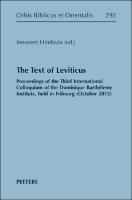The Text of Leviticus
Proceedings of the Third International Colloquium of the Dominique Barthélemy Institute, held in Friboutg (October 2015)
Contributor(s)
Himbaza, Innocent (editor)
Language
English; FrenchAbstract
The book of Leviticus is by far the most quoted in rabbinic literature such as the Mishna or the Talmud, while it has been marginalized in the Christian tradition. Nevertheless, scholars of both traditions have again become highly interested in it for some decades now. As shown by many recent publications, the book is thoroughly studied for textual, literary, historical and reception aspects. It has often been said and written that the text of Leviticus is stable in comparison to many other books of the Hebrew Bible, and that its Greek translation is quite literal. Yet, the text of Leviticus continues to raise questions, not only regarding its content and textual witnesses, but also its interpretation, history and reception. The third international colloquium of the Dominique Barthélemy Institute, held in Fribourg in October 2015, aimed to bring together some specialists of the text of Leviticus in order to advance research on its textual witnesses and the aforementioned topics. The articles collected in this book reflect the width of current research. They deal with the witnesses to the text of Leviticus in the Dead Sea Scrolls, the Masoretic Text, the Samaritan Pentateuch and the Septuagint. They also study the book’s Hebrew editing; its relation to other books such as Joshua, Luke-Acts and Flavius Josephus; and the challenge of its translation, with a case study in French.
Keywords
Leviticus; Bible; Old Testament; text criticismPublisher
PeetersPublication date and place
Leuven; Paris, Bristol, CT, 2020Series
Orbis Biblicus et Orientalis, 292Classification
New Testaments


 Download
Download Web Shop
Web Shop